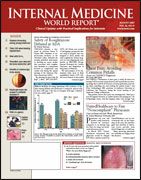Publication
Article
Internal Medicine World Report
Women Use Emergency Contraception More, If Counseled
Author(s):
Few Doctors Discuss Topic with Sexually Active Patients
By Wayne Kuznar
TORONTO, CANADA—Few women are counseled about emergency contraception, but those who are counseled are more likely to use it, said Eleanor Bimla Schwarz, MD, at the Society of General Internal Medicine annual meeting.
Of the women who do use emergency contraception, few use it repeatedly, according to the results of a survey she presented.
The National Survey of Family Growth, conducted in 2002, included 6785 teenaged and reproductive-aged women (15-44 years) who reported having sex with men. Of these, 3.2% said that they were counseled about emergency contraception. Only 7% of women who received a Pap smear or a pelvic exam reported that their physician had discussed emergency contraception with them.
Of those who were counseled, 27% reported that they received their counseling from a family planning clinic, and 26% said they received counseling from a private physician.
Several variables predicted the likelihood of receiving emergency contraception counseling. Women more likely to receive such counseling were those younger than 30 years, those who ever had an abortion, those who had ever been married, and those who were black or Hispanic.
Some 4.2% had ever used emergency contraception. "Of those who reported using it, 73% reported using it only once," said Dr Bimla Schwarz, who is an assistant professor of obstetrics, gynecology and reproductive science, University of Pittsburgh.
Women who had been counseled about emergency contraception use in the previous 12 months were almost 12 times as likely to report ever having used emergency contraception as women who had not been counseled, she said.
Women who had ever used emergency contraception were more likely to be college graduates, have >1 lifetime sexual partner, be younger than 30 years, have never been married, have had their sexual debut before age 16, have had an abortion, and have an intention to have children in the future.
The use of emergency contraception was commonly prompted by a concern about contraceptive failure at last intercourse (39%) and the lack of use of any form of contraception (43%).
The applicability of these results to women today is uncertain, said Dr Bimla Schwarz. In August 2006, the FDA allowed persons older than 18 years to obtain emergency contraception without a prescription. "I believe that counseling will remain important even if women have access to emergency contraception without a prescription," she said.
"It is appropriate to counsel about emergency contraception anytime I'm recommending a method with a potential for failure," she added.
She tells patients that emergency contraception is safe, with the most common side effect being nausea, which occurs in only about 10% of users. She also emphasizes that its use does not affect future fertility. She advises patients to "keep it where you can find it."
Advance provision of emergency contraception has not yet been shown to reduce abortion rates or pregnancy rates, says Jennifer Zebrack, MD.
Key Points
- Women who are counseled about emergency contraception are more likely to use it than women who do not receive such counseling.
- But very few women are counseled; only 7% of physicians counsel sexually active women about this method.
- Discuss the option of emergency contraception anytime you recommend a method with a high rate of failure.
Women who obtain emergency contraception do not have a higher rate of sexually transmitted diseases nor are they less likely to use nonemergency forms of contraception compared with women who do not obtain emergency contraception, said Dr Zebrack, associate professor of medicine, University of Nevada, Reno.
"I discuss emergency contraception with women who have a higher rate of contraceptive failure, such as those who are noncompliant with oral contraception and those with previous elective abortions," she said.





